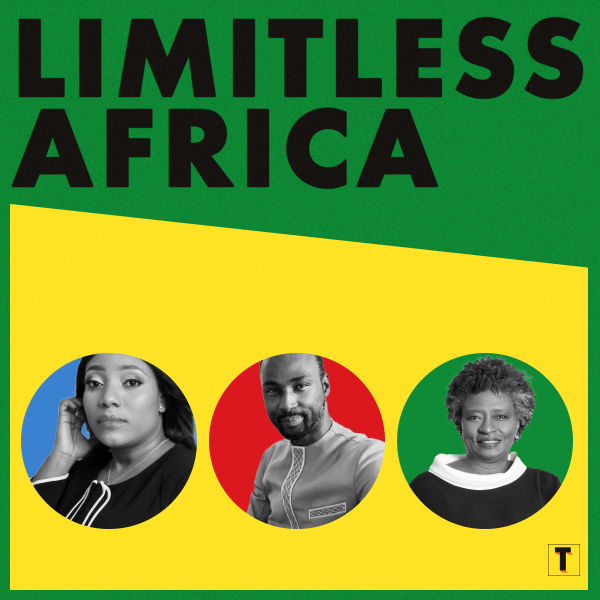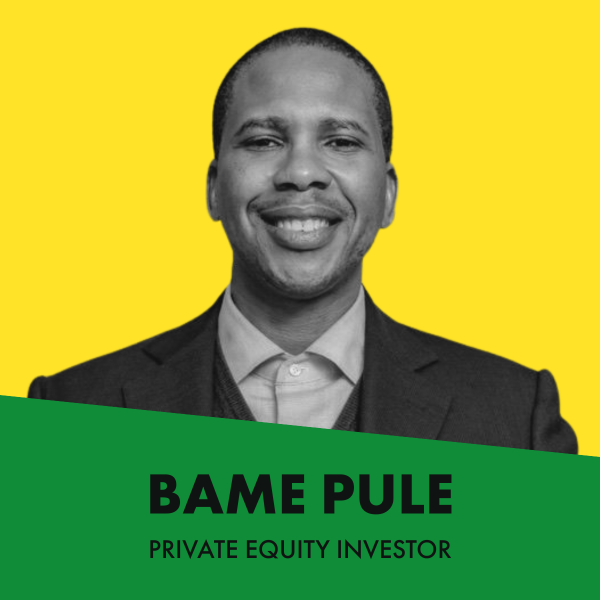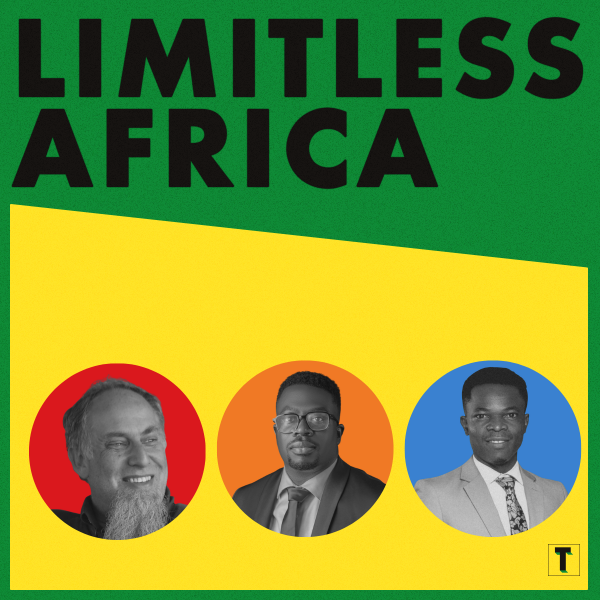Claude: In this episode we’re talking tech and health
Welcome to Limitless, the podcast that asks the questions that matter for Africa.
In each episode, we’re asking three guests one question that matters to Africans. We’re looking for African solutions to African problems.
The Limitless Podcast is supported by the U.S. Department of State and the Seenfire Foundation.
We need more doctors in Africa. According to the United Nations, Africa has approximately 1 doctor for every five thousand people. The continent has just 1.3 percent of the world’s healthcare workers, yet it bears 25 percent of the global disease burden. Can technology help us reduce this healthcare inequality?
Joannie Bewa is a doctor and public health scientist from Benin. She works a lot with the United Nations. She has recently launched a digital healthcare platform called Dotoh which hosts online doctor appointments. Here’s our conversation.
Dr Joannie Bewa, welcome to Limitless Africa. What do you see as the next healthcare challenge for Africa?
Joannie: Well, that’s an excellent question. I love this type of you know, thought provoking and futuristic question. But let me share with you why I got into this work because it’s gonna enlighten you and our listener about why am I so passionate, both at the clinical level as a medical doctor, both as a researcher and scientist but also as an advocate, who is advancing policymaking and advocacy and Lobbying.
When I was a child, my you know, personally around nine years old 9,10, I almost died from severe complication of health issues, that I was lucky enough to have a provider that was not too far from my household, who knew what was what was happening, who could make a quick diagnosis because I was literally not breathing. And he was about to save me. And that’s when I made a decision that all my life will be dedicated to health care.
And as if that was not enough. At 12, one of my best friend had an unintended pregnancy, shel have an abortion and she died from it. And these very traumatic events, reinforce my personal commitment to healthcare.
And then to answer your question, that is really where I’m coming from the lens of healthcare, the lens of policy, the lens of educating people and community but also the lens of being part of the solution and not waiting and not blaming government.
Now to answer the second lens of that question, what do I see as challenges…
Well, first of all, I see one major priority, it’s pandemic preparedness, pandemic preparedness and infectious diseases prevention. We still need to plan and prepare for on a more holistic manner, from risk communication, from detection to surveillance but also from strengthening laboratory capacity, including diagnosis capacity.
My own agenda, which has remained the same women’s health, family health because we don’t want to exclude men at all, family health, reproductive health for both girls, women, boys and men represent a key challenge I will continue within an epidemic and I will even say a pandemic of voluntary pregnancies during the COVID 19 pandemic because of the lack of access and accessibility, to counselling to family planning provision, or to basic screening, right.
Claude: And how do you think that technology can help solve these types of healthcare challenges?
Joannie: I also swear a lot by technology. And health. This is the era of artificial intelligence, but it’s also the era of very basic technology. Using mobile health using eHealth using basic solutions that local community can benefit from and that’s really why during the pandemic, my organisation myself, we come together and we work on a proposal and we develop an innovative platform that we call to D O T O H. Dotoh Health and Dotoh is actually deployed and helps individual book appointments with the providers, have a tele-consultations on the platform, because yes, Dotoh is another tele-consultation platform.
Digital health is beyond telehealth. That’s really what we want to champion as as though we really want to start as a teleconsultation solution platform but our aim is really to move to have a full blown telemedicine solution that you can add AI IoT connected devices to really provide the best and personalised quality of care for people living in Africa because yes, people living in Africa also deserve the best quality and the most cutting edge of health that exist on Earth.
Claude: Mountaga Keita is an inventor and successful businessman from Guinea. I asked him about technological inventions that would really make a life and death difference in Africa. He has invented a portable diagnosis machine and a portable ultrasound machine which is used by doctors in Guinea. Here’s our conversation.
Mountaga Keita, welcome to Limitless Africa. Tell us about your invention for the medical field – How did it come about?
Mountaga: First of all, it’s the man, the moment and the machine. I had to bring the right machine at the right moment.
I had my grandma, who was about 100 miles from the capital city. She was 96 years old, and they called one time and they say, ‘Oh, she wasn’t well. She’s been sleeping for three days.’ I said: ‘what? Nobody can sleep for three days. Maybe she’s in a coma or something like that.’ So in a rural area, we sent an ambulance, and we brought her back here, but when they came, she expired. Her body didn’t handle the transportation to here. That’s where the idea came.
If I take these interactive kiosks, and I transform them into telemedecine devices, and I managed to do it and the data is transported perfectly in a very secure manner. Now, since it’s heavy to carry the kiosk, almost 200 pounds, then I decided to build a miniature-briefcase, a telemedicine-type briefcase. I managed to do it when covid came. I brought the tablet out, and people really liked it a lot. And with doctors here, we managed to deploy into the biggest hospital, and the doctors here even sent a report to the President.
Claude: And how do you think technology can help to overcome some of these healthcare inequalities?
Let’s take this example here: the medical evacuation. People cannot afford to evacuate their parents. If I take my driver here, or I take the maid in my house, or I take one of my engineers here, or any person here, like in the streets here, they can’t afford it. How about now, with a device that I just plug on their fingers, I can get all the vital signs, transfer to any doctors here, in an other city or abroad. So now what we do is not a physical medical evacuation. We do the medical data evacuation, which is really cheaper. So that will really solve the inequalities here.
This example that you give is very convincing. Can you perhaps give us another example of a technology that can help people in rural areas get treatment, or at least some sort of help when it’s so time sensitive?
Take the example, for example, expecting women, prenatal medicine. In rural areas, you have to hop on a bicycle, on a motorcycle to get into a small city, to get really good medical attention. How about if we can take like this medical briefcase, we get into what we call a medical desert… You have expecting women there, pregnant women. How about doing the ultrasound right there? Showing them the position of the foetus and also transmitting the information so another specialist, like in the city, can see if the baby is well positioned, depending on the month or not.
Because we don’t know how the baby is positioned in the womb, and now we can see it. We can see in the hut, in a small house, because we have ultrasound embedded into this tablet here. So we can perform that.
I’ll give you an example. If we perform an ultrasound to a woman who is eight months or maybe nine months pregnant, and then we see the position that we call in France, the position ‘du siege’ – like the baby is coming by the rear, the mom can die. The mom needs a C section. We can really tell us the hospital in the city: Hey, send an ambulance here, there is a lady who may die if she tried to give birth this way, because she she will need c section. And C section is free in my country. Then we can save a life because pregnant women mortality is really high in Africa.
Claude: Dr Magda Robalo is a medical doctor from Guinea-Bissau. She has worked for the World Health Organisation in Zimbabwe, Congo, Namibia, Ghana and as Minister of Health in her home country. She is President and co-founder of Institute of Global Health and Development. I started off by asking her: What’s the next healthcare challenge for Africa? And how can tech help solve it?
Magda: The challenges of the world, particularly when we look into the African continent, they go beyond the next pandemic. As we speak, ah the continent where I come from ah is battling a sharp increase on non-communicable diseases. And by that I mean hypertension, diabetes, cancer, et cetera, which are um taking the lives of millions of people not just in Africa, but around the world, but particularly low and middle income countries.
Is it just about having more money so we can get the right kind of medication? Or is it that technology, which is the other big story of our time, can offer creative solutions.
There’s no doubt that money alone is not the solution. We live in a world where technology will make us achieve more health with less money than never before in the history of global health. As we speak, a report from the World Bank recently mentioned that only 28% of health facilities on the continent have um electricity and internet connectivity. So if we don’t invest in technology such as solar power to make sure our health facilities have access to electricity, money will be able to do so much.
Claude: What I’m really hearing is that you mentioned telemedicine, or we could call it telehealth, which is the use of telecommunication and the new information technologies to provide healthcare services remotely. That is an opportunity for Africa, especially rural areas where the last mile delivery issue is always present. It’s an opportunity if we take that example, but because of poor infrastructure and perhaps lack of information and and also perhaps lack of funding, it’s not taking off in the way that it should, right?
Magda: Absolutely. If you connect our facilities to internet and to electricity, you virtually connect almost every region of a country or every major hospital to tell a medicine to digital health and they will be able to access modern technology from all over the world and see patients diagnose diseases and be guided on how to treat them, get the medicines they need but start from the basics without technology, without electricity, without data connectivity, you will not be able to provide telemedicine digital help to those places.
Claude: Tech is going to be key to building up Africa’s healthcare resources. It’s going to help us collect more quality data for decision makers; allow us to access healthcare workers online and train more health workers through e-learning. But we need better infrastructure before this can happen. Thanks for listening!









